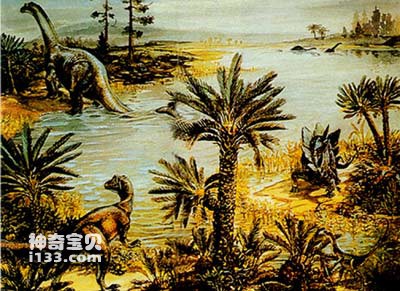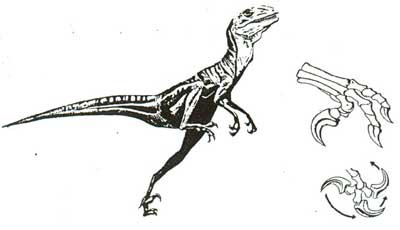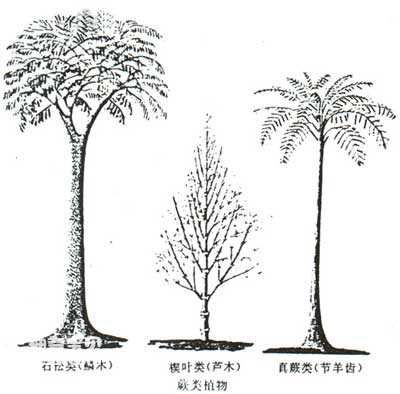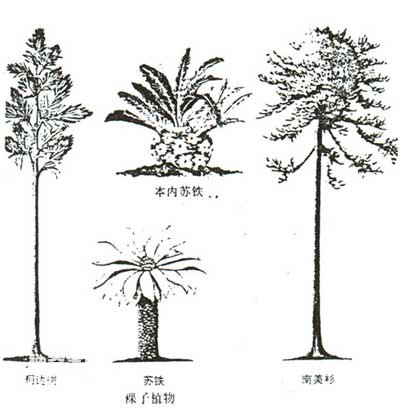Between 270 and 135 million years ago, the main place of biological evolution shifted from water to land. The fern forests on land were gradually replaced by gymnosperms represented by cycads, ginkgo, and metasequoia. The vast land is full of dense virgin forests. But at that time, there was neither the singing of birds nor the fragrance of flowers, and the land seemed monotonous and quiet. There were only dull-moving amphibians wandering slowly in the jungle swamps. Occasionally, large dragonflies about 1 meter high could be seen flying by. At this time, reptiles evolved from amphibians appeared. Judging from the fossils, this stage is the age of dinosaurs.

Jurassic dinosaur
Dinosaurs have survived on the earth for at least 160 million years, and once became the masters who ruled the earth. According to incomplete statistics, there are at least 650 species of dinosaurs that have been named by scientists. These dinosaurs come in different sizes, do strange things, and have different lifestyles, forming a world dominated by strange dinosaurs.
Flying dragons ascend to the sky, fish and dragons descend into the sea. And dinosaurs ruled the land. Dinosaurs can be divided into two categories: those that eat plants and those that eat animals: plant-eating dinosaurs such as hadrosaurs, ankylosaurs, etc.; meat-eating dinosaurs such as Tyrannosaurus rex, Deinonychus, etc. The plants that dinosaurs ate were gymnosperms that were contemporary with dinosaurs. In the same way, carnivorous dinosaurs can only eat "dragon meat" from the same era (plant-eating dinosaurs were preyed upon by carnivorous dinosaurs).

Deinonychus and its sharp claws
Dinosaurs come in different sizes, and some are very large. For example, Mamenchisaurus Hechuan (produced in Hechuan County, Sichuan Province, my country) lived 140 million years ago. It is 3.5 meters tall, 22 meters long, and weighs at least 30 meters. ~40 tons. Such a huge creature, even though it has four pillar-like legs to support its body, it is still very difficult to walk. Some people believe that huge dinosaurs such as Mamenchisaurus in Hechuan spent most of their lives in lakes, using the buoyancy of the water to hold up their heavy bodies, and using local materials, algae and soft plants in the water. They only come to water with hard sand when resting or laying eggs. Small dinosaurs such as Psittacosaurus were only as big as a small dog in their entire body.
The ferocious Tyrannosaurus rex can reach 17 meters in length and is 6 meters tall when standing on its thick hind legs. Its huge mouth has sharp teeth like daggers, which it uses to dominate. There are countless hadrosaurs, ankylosaurs and other plant-eating dinosaurs that became their delicacies. The most brutal and ferocious dinosaur is Deinonychus. Its body does not look as strong as other carnivorous dinosaurs, with a length of only 3 to 4 meters and a weight of only 45 to 50 kilograms. However, it is indeed a dexterous and fierce hunter. And has developed intelligence. This dinosaur had a long, straight tail and distinctive claws. The tail was composed of rod-like bones and was probably used to balance body movements. It was called Deinonychus because each of its feet had a huge and daunting claw. It has 3 toes, each with claws. Its second toe is particularly long, apparently used as an attack weapon. When it encounters prey, it immediately stands up on one leg, throws it forward with the other leg, and stabs the opponent with its sharp claws. The sharp edge is bloody and bloody, so some people say that Deinonychus is more ferocious than Tyrannosaurus rex. dinosaur.

Ferns

plant
animal tags:
We created this article in conjunction with AI technology, then made sure it was fact-checked and edited by a Animals Top editor.